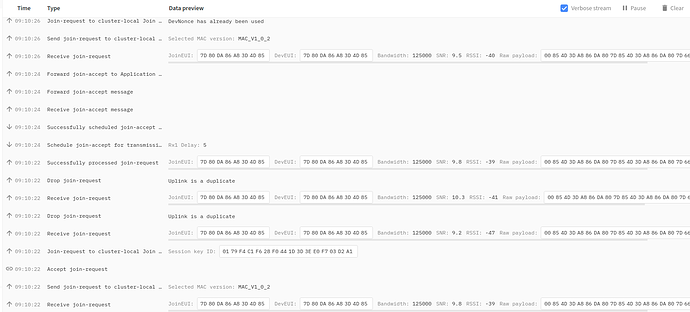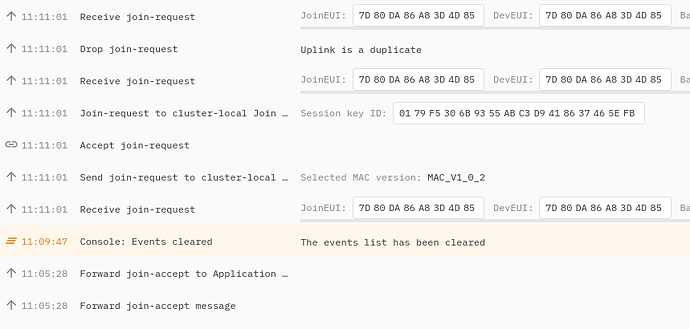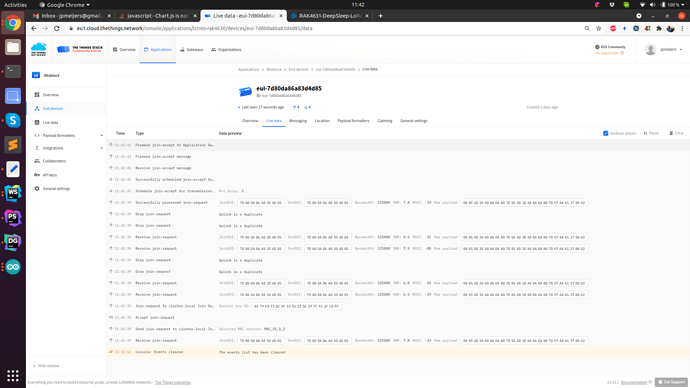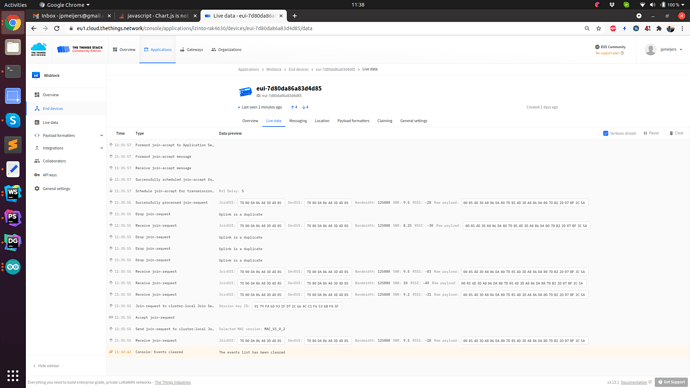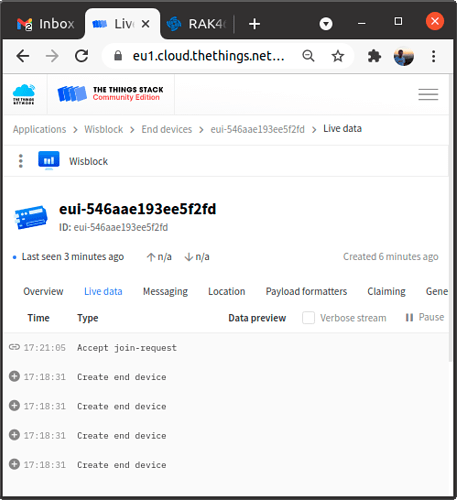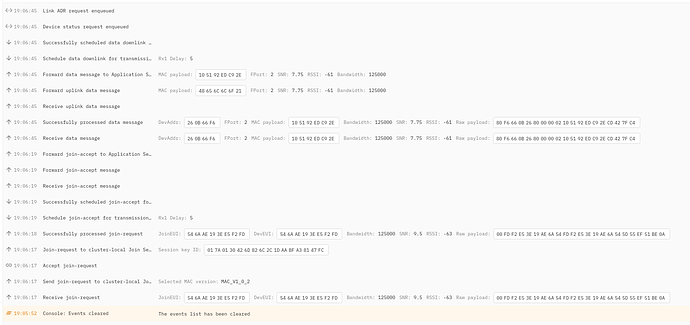Using the example code with serial output enabled (MAX_SAVE commented out), I see the following serial output:
09:09:17.533 -> =====================================
09:09:17.533 -> RAK4631 LoRaWan Deep Sleep Test
09:09:17.533 -> =====================================
09:09:17.566 -> <BRD> SyncWord = 2414
09:09:17.566 -> <BRD> LoRa Task started
09:09:17.566 -> <LMH> OTAA
09:09:17.566 -> DevEui=<REDACTED>
09:09:17.566 -> DevAdd=00000000
09:09:17.566 -> AppEui=<REDACTED>
09:09:17.566 -> AppKey=<REDACTED>
09:09:17.666 -> <LMH> Selected subband 1
09:09:17.666 -> <LMH> Selected subband 1
09:09:17.666 -> Starting LoRaWan task
09:09:17.666 -> Start network join request
09:10:22.592 -> LoRaWan init success
We can see that it took a full minute to go from Start network join request to LoRaWan init success. But even after init success it still hangs as it has not joined.
Looking at the gateway traffic on the TTNv3 console, I see a join request at 9:10:22, and no retries yet (5 minutes) after that.
On the device side I can see the JoinRequest was received, and a JoinAccept was sent at 9:10:24.
In the above feed we need to ignore the duplicate JoinRequests that were received by other gateways. Only the first one is processed.
What likely happens here is that the JoinAccept was either late, or the Wisblock did not receive it.
What I want to see:
- The JoinRequest should be sent immediately, not a full minute after startup. As currently we have the board not sleeping for a full minute.
- The Join should be retried if it failed.
Currently it’s 15 minutes later and the Wisblock still didn’t retry the join, and the serial output is still the same as above.
As a comparison I loaded the LoRaWAN_OTAA_ABP example, using the same keys and OTAA. It joins immediately and successfully directly after startup. This makes me think there is an issue with the DeepSleep example.
RAK4631 is running latest bootloader, and updated BSP and sx126x library (2.0.0).
LoRaWAN_OTAA_ABP output, in which we can see the immediate successful join:
09:25:51.731 -> =====================================
09:25:51.731 -> Welcome to RAK4630 LoRaWan!!!
09:25:51.731 -> Type: OTAA
09:25:51.731 -> Region: EU868
09:25:51.731 -> =====================================
09:25:51.731 -> <LMH> OTAA
09:25:51.731 -> DevEui=<REDACTED>
09:25:51.731 -> DevAdd=00000000
09:25:51.731 -> AppEui=<REDACTED>
09:25:51.731 -> AppKey=<REDACTED>
09:25:51.798 -> <LMH> Selected subband 1
09:25:51.864 -> <LM> OnRadioTxDone
09:25:51.897 -> <LM> OnRadioTxDone => RX Windows #1 4989 #2 5995
09:25:51.897 -> <LM> OnRadioTxDone => TX was Join Request
09:25:56.942 -> <LM> OnRadioRxDone
09:26:17.949 -> <LM> OnRadioRxDone => FRAME_TYPE_JOIN_ACCEPT
09:26:17.949 -> OTAA Mode, Network Sending frame now...
09:26:17.982 -> lmh_send ok count 1
09:26:19.279 -> <LM> OnRadioTxDone
09:26:19.279 -> <LM> OnRadioTxDone => RX Windows #1 5030 #2 5995
09:26:25.484 -> <LM> OnRadioRxDone
09:26:25.484 -> <LM> OnRadioRxDone => FRAME_TYPE_DATA_(UN)CONFIRMED_DOWN
09:26:25.484 -> <LM> Calling MacMcpsIndication
